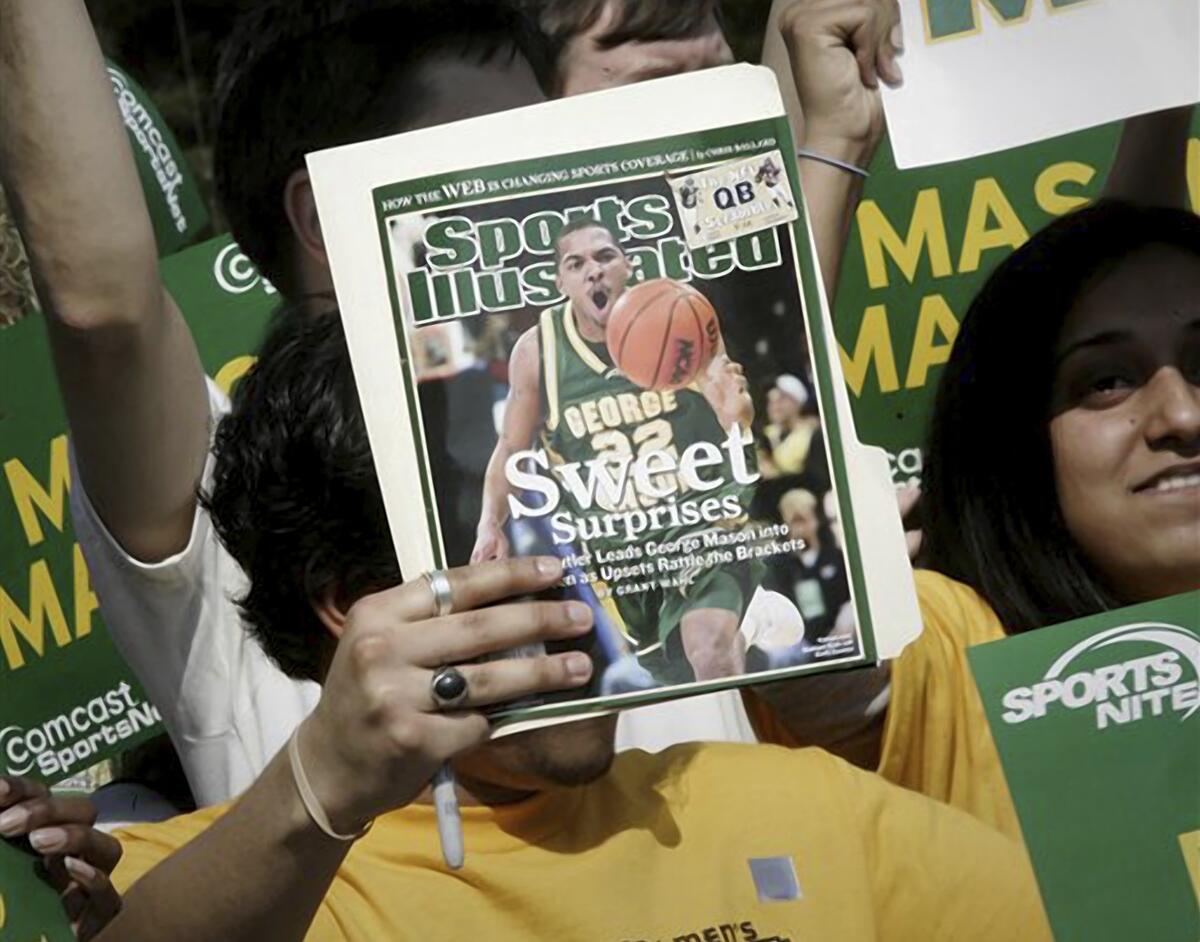The depressing fall of Sports Illustrated reveals the real tragedy of AI

- Share via
Quick, name five classic American magazines.
Did you say Sports Illustrated? I did. And I’m not even a sports guy. But if you’re of a certain age, you know Sports Illustrated. Along with, say, People, Time and National Geographic, it has long lined the dentist offices, neighbors’ doormats and coffee tables of your life. It’s an institution. At one point, it boasted 3 million subscribers. It’s won numerous awards and accolades. The evening news would do whole segments about its swimsuit issue.
Today, it’s pumping out third-rate articles by AI-generated writers in a darkening corner of the internet. It’s a stunning fall for one of the great icons of American sports journalism. So what happened? How did such a celebrated publication get here? The answers point us to one of the most pressing — and unlikely — dangers posed by the ongoing AI boom.
First, the facts: On Monday, the tech and culture site Futurism published an expose that revealed Sports Illustrated was publishing bizarre and badly written articles attributed to authors that didn’t exist.
The reporters traced the fake authors’ headshots to a website that sells AI-generated images, and sources told them that the stories they allegedly wrote were produced by AI, too. “The content is absolutely AI-generated,” one said, “no matter how much they say that it’s not.” When contacted, Arena Group, Sports Illustrated’s publisher, deleted all of the suspicious content and, in a statement, denied it was created by AI. Arena blamed the mess on AdVon, a third-party company hired to produce content.
The saga has been heatedly discussed by journalists and media watchers, and lamented by onetime fans of the iconic brand. Generative AI very much remains a hot-button topic, and the question of whether it’s ethical — or a good idea — to use AI has driven much of the conversation.
The hottest startup in Silicon Valley is in flames. So is the fiction that anything other than the profit motive is going to govern how AI gets developed and deployed.
But it’s worth backing up and looking at the bigger picture here, and the conditions that led to the use of such sketchy AI in the first place. Because this story is as much about bad management, sheer laziness and how relentlessly profit-seeking corporate management can erode our cultural institutions as it is about any given technology.
Sports Illustrated was already in dire shape long before Arena brought in the AI. Amid economic challenges that confront all print media, the magazine’s revenue and subscriber base declined over the 2010s. It repeatedly downsized, switched from a weekly to a monthly publication schedule and was sold by its owner, Time Inc., to a company called Authentic Brands Group, or ABG, which is in the business of inking lucrative licensing deals. ABG then sold a 10-year license to publish Sports Illustrated to our new friends at Arena Group.
As a result of this arrangement, Sports Illustrated branding is now showing up both on dietary supplements and on thousands of hastily produced blog posts. After all, on the publication side of the business, “Arena’s options for generating revenue are somewhat limited, encouraging a daily churn of articles,” as the New York Times reports. “Hundreds of sites dedicated to individual teams — helmed by non-staff writers paid small sums — were created with little oversight and diluted what it meant for ‘Sports Illustrated’ to write something.” Arena has continued to fire editors and staffers, while enforcing weekly quotas of article production. (On the licensing side, business is booming — ABG says it has doubled Sports Illustrated’s earnings. That’s a lot of Sports Illustrated-brand diet pills. It also launched an online SI-branded casino in 2021.)
In other words, Sports Illustrated is run by not one but two vampiric entities with markedly little interest in the magazine’s erstwhile core mission — you know, the thing that made it so beloved in the first place, doing good sports journalism — and every interest in maximizing profits at every opportunity. And they have squeezed the lemon until it was dry.
And here’s where the AI comes in.
Not as a tool deployed by forward-looking executives eager to embrace the future, but as a last-ditch effort to extract the final bits of value from the pieces of something that’s already broken. Sports Illustrated has already slashed full-time staff, spun up a content mill with freelancers pumping out content for a fraction of the price, and let editorial standards sink into the gutter. The AI play is an arrow out of the same quiver.
OpenAI allegedly used writers’ work without their consent to train its AI chatbot, ChatGPT. Now, outraged writers are speaking out. They deserve credit and compensation for their work.
It’s increasingly clear that to those in the content generation business — worth noting maybe that the original founders of Sports Illustrated would probably bristle at such a term — AI has become popular as a relatively cheap, wholly unimaginative way to attempt to generate value with the lowest amount of effort or investment.
To wit: This year has already seen a rash of AI scandals in the media world. The staffers of G/O Media, the publisher of popular sites including Gizmodo and the Onion, revolted after their publisher deployed generative AI to produce bland, error-ridden content. The once-venerable tech site CNET was caught — also by Futurism, incidentally — publishing AI-generated stories without disclosing them as such. BuzzFeed controversially announced that it would be using AI to generate posts like its trademark quizzes, and then disbanded its human-staffed News division.
Most recently, Gannett, the publisher of USA Today and many other newspapers, was accused of publishing AI-generated review content — curiously, it too blamed AdVon, the same company Sports Illustrated fingered in its statement on the matter.
All of these stories have one major thread in common — each of the media institutions in question had been facing economic challenges, and was run by an owner whose interest was not in producing a quality publication but gaming the algorithm to maximize profits while minimizing staff. As with SI, all were in dire straits before AI entered the equation.
G/O Media, formerly GMG Media, formerly Gawker Media, had been bankrupted by a malicious lawsuit funded by Silicon Valley titan Peter Thiel, repackaged and sold to Univision, then sold again to a private equity firm, Great Hill Partners. In a push to maximize revenues, Great Hill set about firing staffers, introducing spammy autoplay ads and asking staff to write more slideshows, which require readers to click more times than regular stories. In short, a nakedly profit-seeking agenda — one that came at the direct expense of both staff and readers — was in place long before the publisher started mucking around with AI.
When it finally did, notably publishing an article whose sole purpose was to list the “Star Wars” movies in order and yet got the order wrong — it caused an uproar.
Companies all over are laying off workers while experimenting with new AI-powered productivity tools. The connection is both obvious and maddeningly hard to pin down.
Similarly, CNET has been hurting for years. Once a powerhouse of tech media, it was acquired by CBS for $1.8 billion in 2008, then was sold to a little-known private equity company based in South Carolina called Red Ventures. The Verge describes its business model as “straightforward and explicit: it publishes content designed to rank highly in Google search for ‘high-intent’ queries and then monetizes that traffic with lucrative affiliate links.” AI was used, it is believed, to streamline and maximize that process.
Both CNET and G/O are now owned by private equity firms, and much has been written about what a disaster it’s been for journalism to hand such companies the keys — one academic paper even quantified the damage. Which has been considerable.
As a journalist, all of this depresses me — I worked for Gizmodo for a bit, and was once an avid reader of Gawker, Deadspin and the AV Club, all of which have been gutted. BuzzFeed News won a Pulitzer and was widely loved. Sports Illustrated was a legend.
And look, things change. Cultural institutions evolve, fade, die out. Not every magazine needs to exist forever. But it is a bummer when an otherwise popular, viable, even beloved cultural institution is killed off — while there’s a team that’s working overtime at the helm that wants to keep the lights on — because a Wall Street firm or an adventuring licensing company can increase earnings at the margins by cutting out its heart.
The tragedy of AI is not that it stands to replace good journalists but that it takes every gross, callous move made by management to degrade the production of content — and promises to accelerate it.
If journalists are outraged at the rise of AI and its use in editorial operations and newsrooms, they should be outraged not because it’s a sign that they’re about to be replaced but because management has such little regard for the work being done by journalists that it’s willing to prioritize the automatic production of slop.
AI does not emerge from a media company’s innovation lab but from a handshake deal with a shady third-party company. It’s a hail Mary move that aspires to take the place of formulating a real plan to turn a business around — a future-shaped Get Out of Jail Free card for business leaders confronting bad times. And it’s almost certain to fail to deliver.
- Share via
Watch L.A. Times Today at 7 p.m. on Spectrum News 1 on Channel 1 or live stream on the Spectrum News App. Palos Verdes Peninsula and Orange County viewers can watch on Cox Systems on channel 99.











